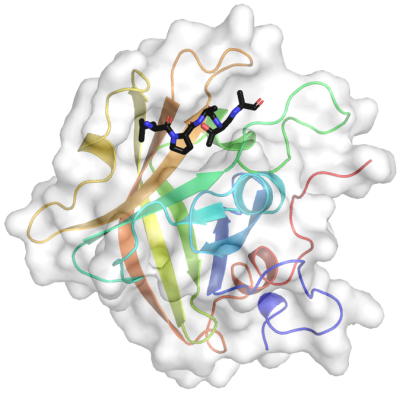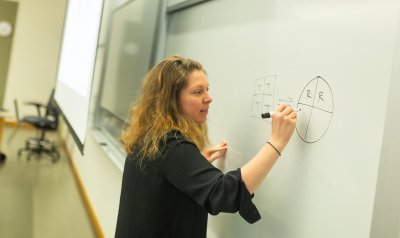For Western’s Jeanine Amacher, ‘Good Things Come in Threes’
They say bad things come in threes, but don’t tell that to WWU Assistant Professor of Chemistry Jeanine Amacher. She has received three career milestones during just this school year alone – a paper about to be published and a pair of important grants – and she shows no signs of slowing down anytime soon.
“It feels odd to say anything positive about the past year given the pandemic, but wow, I’ll take it,” Amacher said.
And while it always feels good to receive grants and get work published, perhaps the biggest recipients of these three milestones are Amacher’s students.
The Paper
To start off, Amacher and her co-author, WWU Associate Professor of Chemistry John Antos, have a paper on their research currently in revision at a peer-reviewed journal and available on the preprint server bioRxiv. In its broadest sense, Amacher’s research, as detailed in the paper, looks into how small sequences of amino acids, or peptides, interact with bacterial sortase enzymes. Specifically, they use chimeric proteins, where a piece of a protein sequence -- in their case, the sequence that corresponds to a loop in the conserved structure -- is inserted into a related protein.
“Sortases are a very useful tool in protein engineering because they cut proteins up and can also stitch them back together, given the right recognition sequence. Theoretically, you could therefore attach a protein to pretty much anything, like a small molecule drug, synthetic support, or a whole cell, using sortase enzymes,” she said. “A better understanding of how these types of protein domains recognize their targets, and how specificity is achieved, directly contributes to protein engineering efforts and a greater knowledge of human health and disease.”
Additional authors on the paper are students or recent alumni Izzi Piper (starting on her doctorate at the University of California at Berkeley in the fall), Sarah Struyvenberg (2020 graduate school alumna now working at Lumen Biosciences in Seattle), Jordan Valgardson (WWU alumnus now a second-year doctoral student at Stanford), Alex Johnson (starting his doctorate at CalTech in the fall), Melody Gao (currently applying to medical school), 2020 alumna Katherine Johnston (currently working at Cepheid in Seattle), Justin Svendsen (starting on his doctorate at the University of Oregon in the fall), and current Western sophomore Hanna Kodama.
“We couldn’t do this without our students. They are a huge part of this department’s success, let alone the success of my lab,” she said.
Kodama says the opportunity to participate in cutting edge research work during only her second year at Western was something she simply couldn’t pass up.
“I love working in the Amacher lab for so many reasons: the people, the hands-on experience, the chance to work with expert biochemists -- the list could go on and on. I know that Dr. Amacher and my teammates really care about giving me and the other undergraduates the opportunity to contribute real data to real research. Essentially, I'm not just in here washing dishes,” Kodama said.
The Grants
Just like her work on the paper, students and their work in her lab are at the core of not only why Amacher received her two recent grants, but why she even bothered to apply for them in the first place.
“Equity in the sciences for my students is something I’m incredibly passionate about,” she said. “And I structured both of these grant applications to help address these issues. Most undergraduate research opportunities require a certain base of knowledge and the ability to easily connect with faculty that doesn’t always feel equitable. These grants, in one way or another, are about not only science and teaching, but how to break down some of those barriers.”
The first grant is a National Science Foundation CAREER grant for $660,000 over five years, and while it will fund the research of her lab into how structurally-conserved loops in proteins near the binding or active site affect target interactions and enzyme activity, there is far more than meets the eye about the award.
CAREER grants are typically given by the NSF to support the research of young teacher-scientists who have shown significant promise, as a way of making sure they have the funding needed to take their research to the next level. As such, the grant isn’t just acknowledging her research, but her work as an educator as well, something that Amacher said she is very proud of, especially as she will be joining five other current Chemistry faculty members in being funded currently or in the past by the NSF in this way.
“This grant is about continuing our work for five more years in an environment where I can support students and help them get published and then on to where they want to be. Will the grant be used to help students learn valuable science? Yes. But just as importantly, can it be used to get them where they want to go when they leave Western – whether that’s a doctoral program, a master’s program, or medical school? Yes, it can do that too, which I love.”
Amacher said the grant will also allow her to continue to put on and expand a Life Science Symposium for students from Western and other local institutions.
“We intend to promote more diverse, equitable and inclusive student recruitment by hosting and organizing the symposium,” she said. “We can facilitate this by providing access to near-peer mentoring from doctoral students and postdocs.”
Like the CAREER grant, the second grant, a $100,000 Cottrell Scholar award from the Research Corporation for Scientific Advancement, is about honoring an up-and-coming young faculty member who exemplifies what the RCSA calls “outstanding teacher-scholars.” The RCSA only hands out 25 Cottrell Scholar awards each year, with the majority going to faculty members at large Research 1 universities. Again, the Chemistry department at Western has a strong track record of being honored in this way, with nine current or past Cottrell Scholar faculty members.
“The Cottrell, at its heart, is all about that concept of teacher-scholars, and that is exactly what we do at Western. You can’t just be one or the other – you have to be both. So while getting a Cottrell is such an incredible honor, it’s also a testament to the vision of our department, and of the university, about what is important,” she said.
Part of the funding from the Cottrell will be used to enhance Amacher’s research into sortases and protein engineering, while the rest will be used to focus on Amacher’s passion around equity in the sciences and breaking down the barriers that hold some students back from being able to participate in research opportunities like those Kodama has so enthusiastically attached herself to. For example, part of the Cottrell funding will be used to create a lower-division elective course introducing students to research at Western, which in conjunction with other support opportunities such as the Life Sciences Symposium, will make more research opportunities available for Western’s students.
Kodama said the nurturing yet challenging nature of working in the Amacher lab is rewarding enough already - let alone what she feels she will be able to accomplish over the next two years.
“Dr. Amacher challenges us to consider the potential pathways following our undergraduate years, and how we can use our time and energy now to prepare ourselves. I'm also learning a lot from older students about grad schools, gap years, careers, and where I might fit into all of it. I'm especially excited to start experiencing the other side of research, which is sharing our work with the outside world through papers and posters,” Kodama said. “Participating in that aspect of the lab will prepare me to one day participate in conferences and collaboration with other scientists.”
Quotes like that are music to Amacher’s ears.
“All of the preliminary work for both grants and most of the data in the paper was directly collected by students, and now we will have even more opportunities like those for students in the years to come,” she said.
Jeanine Amacher completed her doctorate at Dartmouth in 2014, did postdoctoral research at the University of California at Berkeley from 2014-2017, and started at Western in 2017. For more information about her two new grants, her upcoming paper, or the annual Life Sciences Symposium, contact her at Jeanine.amacher@wwu.edu.

